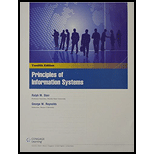
PRINCIPLES OF INFO.SYS.(LL)>CUSTOM PKG<
12th Edition
ISBN: 9781337074674
Author: STAIR
Publisher: CENGAGE C
expand_more
expand_more
format_list_bulleted
Concept explainers
Question
Chapter 11, Problem 6DQ
Program Plan Intro
Artificial Intelligence (AI) simulates thinking and behaves as human such as the capability of giving reason and learning.
- Its main aim is to develop a system which mimics human intelligence.
- It increases the speed and consistency of decision making, helps in solving the problems without lending complete information.
- The problems which cannot be solved by the conventional computing can be resolved using the AI system.
Components of Artificial Intelligence:
The six key components of AI are as follows:
- Expert systems
- Robotics
- Vision systems
- Natural language processing
- Learning systems
- Neural networks
Natural language processing:
- Natural Language processing is one of the key components of Artificial Intelligence.
- As the name suggests, it allows the processor to understand and respond to the statements and commands (human level) that are given in natural language like English.
- The input and output of natural language processing system will be speech and written text.
- There are two components of Natural Language Processing (NLP). They are: Natural Language Understanding and Natural Language Generation.
Expert Solution & Answer
Want to see the full answer?
Check out a sample textbook solution
Students have asked these similar questions
Design and draw a high-level "as-is" process diagram that illustrates a current process related to a product or service offered through the SSDCI.gov database.
Compare last-mile connections for connecting homes and businesses to the Internet
Explain wireless networking standards
Chapter 11 Solutions
PRINCIPLES OF INFO.SYS.(LL)>CUSTOM PKG<
Ch. 11.4 - Prob. 1DQCh. 11.4 - Prob. 2DQCh. 11.4 - Prob. 1CTQCh. 11.4 - Prob. 2CTQCh. 11.5 - Prob. 1DQCh. 11.5 - Prob. 2DQCh. 11.5 - Prob. 1CTQCh. 11.5 - Prob. 2CTQCh. 11 - Prob. 1SATCh. 11 - Prob. 2SAT
Ch. 11 - Prob. 3SATCh. 11 - Prob. 4SATCh. 11 - Prob. 5SATCh. 11 - Prob. 6SATCh. 11 - Prob. 7SATCh. 11 - Prob. 8SATCh. 11 - Prob. 9SATCh. 11 - Prob. 10SATCh. 11 - Prob. 11SATCh. 11 - A(n) ______ is a collection of software packages...Ch. 11 - Prob. 13SATCh. 11 - Prob. 14SATCh. 11 - Prob. 15SATCh. 11 - Prob. 16SATCh. 11 - Prob. 17SATCh. 11 - Prob. 18SATCh. 11 - Prob. 19SATCh. 11 - Prob. 20SATCh. 11 - Prob. 21SATCh. 11 - Prob. 22SATCh. 11 - Prob. 23SATCh. 11 - Prob. 1RQCh. 11 - Prob. 2RQCh. 11 - Prob. 3RQCh. 11 - Prob. 4RQCh. 11 - Prob. 5RQCh. 11 - Prob. 6RQCh. 11 - Prob. 7RQCh. 11 - Prob. 8RQCh. 11 - Prob. 9RQCh. 11 - Prob. 10RQCh. 11 - Prob. 11RQCh. 11 - Prob. 12RQCh. 11 - Prob. 13RQCh. 11 - Prob. 14RQCh. 11 - Prob. 15RQCh. 11 - Prob. 16RQCh. 11 - Prob. 17RQCh. 11 - Prob. 18RQCh. 11 - Prob. 19RQCh. 11 - Prob. 20RQCh. 11 - Prob. 1DQCh. 11 - Prob. 2DQCh. 11 - Prob. 3DQCh. 11 - Prob. 4DQCh. 11 - Prob. 5DQCh. 11 - Prob. 6DQCh. 11 - Prob. 7DQCh. 11 - Prob. 8DQCh. 11 - Prob. 9DQCh. 11 - Prob. 10DQCh. 11 - Prob. 11DQCh. 11 - Prob. 3TACh. 11 - Prob. 1WECh. 11 - Prob. 2WECh. 11 - Prob. 3WECh. 11 - Prob. 2CECh. 11 - Prob. 1DQ1Ch. 11 - Prob. 2DQ1Ch. 11 - Prob. 1CTQ1Ch. 11 - Prob. 2CTQ1Ch. 11 - Prob. 1DQ2Ch. 11 - Prob. 2DQ2Ch. 11 - Prob. 1CTQ2Ch. 11 - Prob. 2CTQ2Ch. 11 - Prob. 1DQ3Ch. 11 - Prob. 2DQ3Ch. 11 - Prob. 1CTQ3Ch. 11 - Prob. 2CTQ3
Knowledge Booster
Learn more about
Need a deep-dive on the concept behind this application? Look no further. Learn more about this topic, computer-science and related others by exploring similar questions and additional content below.Similar questions
arrow_back_ios
SEE MORE QUESTIONS
arrow_forward_ios
Recommended textbooks for you
 Principles of Information Systems (MindTap Course...Computer ScienceISBN:9781305971776Author:Ralph Stair, George ReynoldsPublisher:Cengage Learning
Principles of Information Systems (MindTap Course...Computer ScienceISBN:9781305971776Author:Ralph Stair, George ReynoldsPublisher:Cengage Learning Systems ArchitectureComputer ScienceISBN:9781305080195Author:Stephen D. BurdPublisher:Cengage Learning
Systems ArchitectureComputer ScienceISBN:9781305080195Author:Stephen D. BurdPublisher:Cengage Learning Principles of Information Systems (MindTap Course...Computer ScienceISBN:9781285867168Author:Ralph Stair, George ReynoldsPublisher:Cengage Learning
Principles of Information Systems (MindTap Course...Computer ScienceISBN:9781285867168Author:Ralph Stair, George ReynoldsPublisher:Cengage Learning Fundamentals of Information SystemsComputer ScienceISBN:9781337097536Author:Ralph Stair, George ReynoldsPublisher:Cengage Learning
Fundamentals of Information SystemsComputer ScienceISBN:9781337097536Author:Ralph Stair, George ReynoldsPublisher:Cengage Learning Fundamentals of Information SystemsComputer ScienceISBN:9781305082168Author:Ralph Stair, George ReynoldsPublisher:Cengage Learning
Fundamentals of Information SystemsComputer ScienceISBN:9781305082168Author:Ralph Stair, George ReynoldsPublisher:Cengage Learning EBK JAVA PROGRAMMINGComputer ScienceISBN:9781305480537Author:FARRELLPublisher:CENGAGE LEARNING - CONSIGNMENT
EBK JAVA PROGRAMMINGComputer ScienceISBN:9781305480537Author:FARRELLPublisher:CENGAGE LEARNING - CONSIGNMENT

Principles of Information Systems (MindTap Course...
Computer Science
ISBN:9781305971776
Author:Ralph Stair, George Reynolds
Publisher:Cengage Learning

Systems Architecture
Computer Science
ISBN:9781305080195
Author:Stephen D. Burd
Publisher:Cengage Learning

Principles of Information Systems (MindTap Course...
Computer Science
ISBN:9781285867168
Author:Ralph Stair, George Reynolds
Publisher:Cengage Learning

Fundamentals of Information Systems
Computer Science
ISBN:9781337097536
Author:Ralph Stair, George Reynolds
Publisher:Cengage Learning

Fundamentals of Information Systems
Computer Science
ISBN:9781305082168
Author:Ralph Stair, George Reynolds
Publisher:Cengage Learning

EBK JAVA PROGRAMMING
Computer Science
ISBN:9781305480537
Author:FARRELL
Publisher:CENGAGE LEARNING - CONSIGNMENT